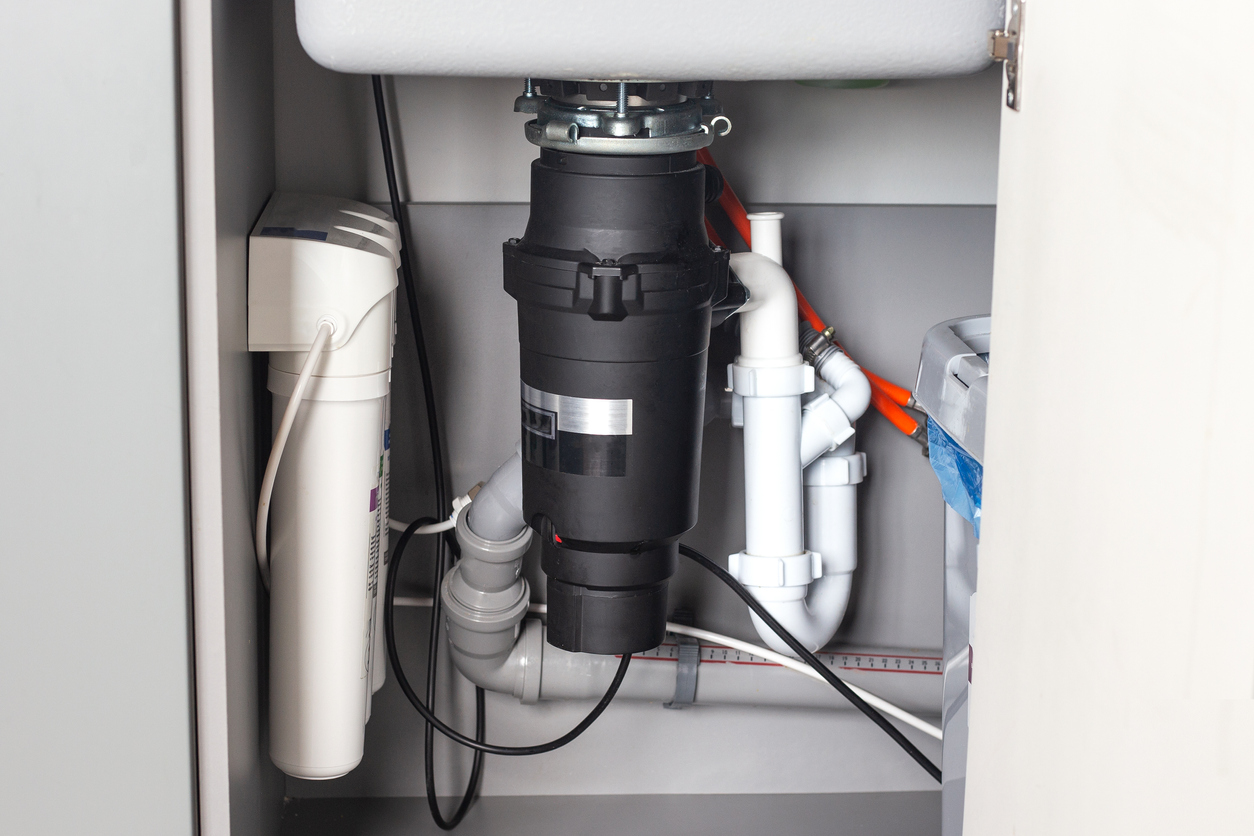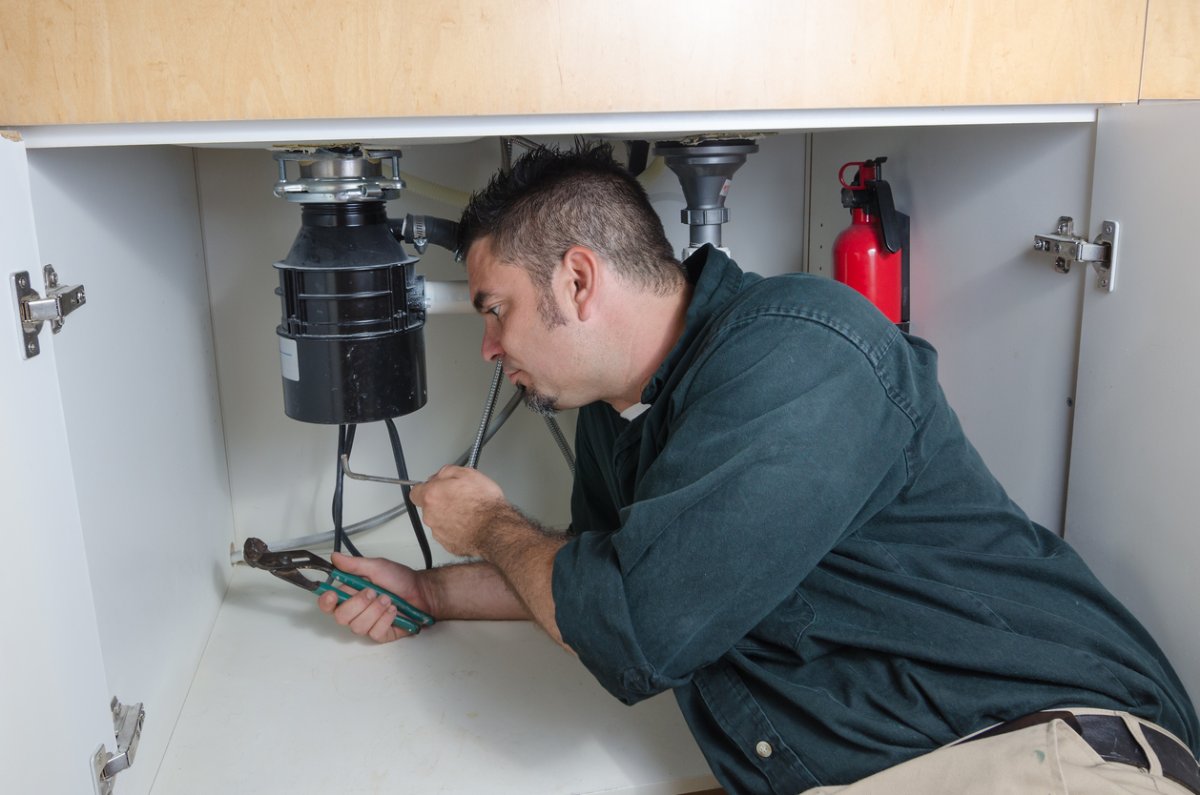We may earn revenue from the products available on this page and participate in affiliate programs. Learn More ›
Q: Help—my garbage disposal stopped working unexpectedly today, and I still have a sink full of dirty dishes to wash! This has never happened before, and I’m not sure who to call. Who fixes garbage disposals?
A: What an inconvenience! Garbage disposals are a great tool for expediting kitchen cleanup, but they aren’t invincible. Fortunately, whether the disposal is jammed, leaking, or not draining, most plumbers are able to repair garbage disposals in short order. Plumbers can troubleshoot garbage disposal issues, make repairs as needed, or install a replacement if the current unit is beyond fixing. Here, homeowners can learn about common issues and when to get in touch with a plumber for garbage disposal repair.
A plumber is the first professional to call when there’s an issue with the garbage disposal.
When it comes to dealing with a broken garbage disposal, a plumber is the pro best equipped to diagnose and repair most problems. Since the garbage disposal is connected to the sink drain, clogs and leaks in a garbage disposal’s plumbing system are some of the most frequent complaints. A plumber will also be able to tell if the disposal is damaged beyond repair and can install a new one if needed.
Sometimes a switch-operated garbage disposal will stop working due to an electrical problem such as a tripped breaker. An electrician may ultimately need to be consulted for this issue, but it’s a good idea to have a plumber assess the situation first, as these pros tend to be most familiar with garbage disposal issues.
There are a number of problems that can occur with a garbage disposal.
You’re probably wondering, “Why has my garbage disposal stopped working?” and the answer is not always clear right away. If the disposal is over 10 years old, the motor may simply have failed due to normal wear and tear. A leaky garbage disposal may have begun to form cracks, which is another sign that it is ready to be replaced. Sometimes the disposal’s blades have become dull, causing clogs, slow draining, and an odor.

Professionals recommend running salt, ice cubes, and lemon slices through the disposal to simultaneously sharpen the blades and clear up any lingering odors. Sometimes the amount of food being put in the disposal is simply more than it is equipped to handle. Garbage disposals come in several different sizes ranging from ⅓ to 2 horsepower depending on the size of the household, so if the current disposal is often clogged or jammed, it may be time for an upgrade.
Garbage disposals typically last between 10 and 12 years.
Homeowners who practice diligent garbage disposal maintenance will likely be able to use the unit for at least a decade before replacement is necessary. A truly broken garbage disposal will usually not show any signs of life, like humming or turning. Most minor issues can be fixed relatively easily, either by a professional or the homeowner. For example, clogs can often be cleared by rotating the disposal manually using an Allen wrench. In some cases, resetting a garbage disposal by pressing the red button on the bottom is all that is needed. If the unit has broken after only a couple of years of use, it’s worth looking into whether it is under warranty—repairs or replacement may still be covered.
The costs to repair or replace a garbage disposal can be similar.
In general, the total cost for fixing a garbage disposal is around $250, including both labor and parts. On the low end, the price to repair a garbage disposal may be as little as $70, but leaks from a worn-out seal or clogs deep in the connected plumbing could cost up to $400 to repair.

If the unit is more than 8 years old and needs multiple replacement parts, it is likely on its last legs. In cases like these, it may be more cost effective to think about replacing the garbage disposal. A brand-new garbage disposal costs around $150 on average, and a plumber or garbage disposal repairman will typically charge close to $80 per hour for labor.
Proper maintenance can keep a garbage disposal running smoothly.
Garbage disposals are quite durable, but in order to get the most out of the unit, it’s important to be mindful of good garbage disposal care. Disposals are not designed to handle large scraps or fibrous foods, so scrape potato peels, bones, eggshells, and corn husks into the trash can instead. Excessive amounts of cooking oils or fats can also cause problems. Running cold water while the disposal is on will prevent oils from melting and coating the blades.
Garbage disposals can also suffer from lack of use. To keep them from rusting or accumulating food waste, homeowners can run salt and ice cubes through the disposal to clean and sharpen the blades. For an extra-thorough clean, pour 1 cup of vinegar and half a cup of baking soda down the drain and scrub around the opening with a long-handled brush.


